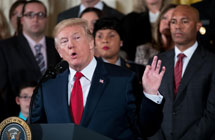这是真的!“假新闻”获选柯林斯词典2017年度词汇
|
从竞选美国总统开始,特朗普与美国媒体的关系一直处于“剑拔弩张”的状态,在特朗普入主白宫以后,这种关系也没有改善。特朗普多次斥责美国主流媒体散播针对他的假新闻,并频频向媒体发难。他称很多媒体为“假消息制造者”。近日,“假新闻”更是被评为柯林斯词典2017年度词汇 It's been derided by the American president and accused of influencing elections.
But 'fake news' is today valid news after being named Collins dictionary's Word of the Year 2017. Usage of the term, which is defined as 'false, often sensational, information disseminated under the guise of news reporting', has risen by 365 percent since 2016 and will be added to the next print edition of Collins Dictionary. While 'fake news' will be added to the print edition, other words that will be added to the Collins Dictionary website include 'gender-fluid', 'cuffing season' and 'Insta'. In his first 11 months as leader of the free world, Donald Trump has regularly claimed that news stories in the media are 'fake news'. He even suggested he invented the word 'fake' last month during an interview. He told Christian channel Trinity Broadcasting: 'I think one of the greatest of all terms I've come up with is 'fake.' 'I guess other people have used it, perhaps, over the years, but I've never noticed it.' Helen Newstead, Collins' head of language content, said: 'Much of this year's list is definitely politically charged, but with a new president in the US and a snap election in the UK it is perhaps no surprise that politics continues to electrify the language. 'Fake news', either as a statement of fact or as an accusation, has been inescapable this year, contributing to the undermining of society's trust in news reporting', she added. Lexicographers, the people who compile dictionaries, also included 'gender-fluid' on their list of words of the year. The phrase was defined as 'not identifying exclusively with one gender rather than another' and has been frequently referred to over recent months. Its increasing popularity has been reflected by stores such as John Lewis and Mothercare who have created clothing ranges which are not labelled as specifically for 'girls' or 'boys'. 'Echo chamber', which refers to sharing opinions in places like social media where only people with similar views will see them, also made it onto the list. Among the most regularly used new words was 'cuffing season', which is the habit of single people seeking a partner for the winter months but not necessarily for a longer period. 'Gig economy', which describes an economy built around temporary or freelance workers and 'Insta', to describe things relating to the photo-sharing app Instagram, were also popular words this year. Last year also saw a political phrase named word of the year - 'Brexit' was chosen by Collins following the 2016 EU referendum. All of the new words and meanings will be added to the Collins Dictionary website and will be considered for inclusion in future print editions.
Corbynmania: Fervent enthusiasm for Labour leader Jeremy Corbyn. Unicorn: Recently launched business valued at more than one billion dollars. Antifa noun: (1) an antifascist organization (2) a member of an antifascist organization; adjective: (3) involving, belonging to, or relating to an antifascist organization Fidget spinner: a small toy comprising two or three prongs arranged around a central bearing, designed to be spun by the fingers as means of improving concentration or relieving stress
2016 - Brexit: Noun meaning "the withdrawal of the United Kingdom from the European Union". 2015 - Binge-watch: Verb meaning "to watch a large number of television programmes (especially all the shows from one series) in succession". 2014 - Photobomb: Verb meaning "spoiling a photograph by stepping in front of them as the photograph is taken, often doing something silly such as making a funny face". 2013 - Geek: Countable noun meaning "someone who is skilled with computers, and who seems more interested in them than in people". |









